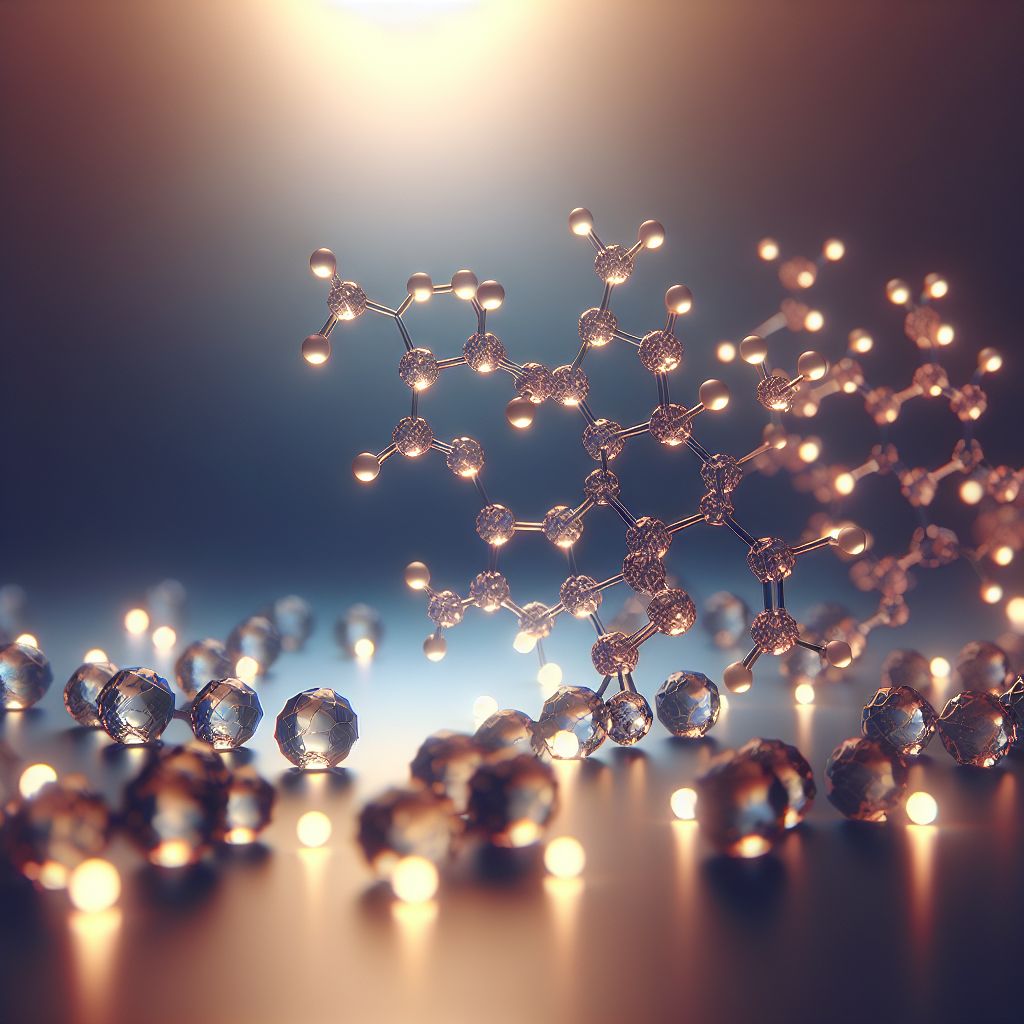
Key Takeaways
-
Sodium hyaluronate is a super hydrator, holding up to 1000 times its weight in water.
-
It benefits all skin types, including sensitive and acne-prone skin, without causing irritation.
-
By attracting moisture, it plumps the skin, smoothing out fine lines and wrinkles.
-
Its anti-inflammatory properties soothe the skin, making it perfect for post-procedure care.
-
Integrating sodium hyaluronate into your skincare routine can enhance your skin’s overall health and appearance.
My favorite Holistic Skincare Products
Arbonne, a leader in the health and wellness industry for over 40 years, remains dedicated to clean beauty and sustainability, prioritizing people and the planet in every decision as evidenced by their Certified B Corporation status.
You can buy Arbonne Skincare Products here.
Unlocking the Power of Sodium Hyaluronate for Ultimate Skin Hydration
Imagine your skin as a sponge in the desert, thirsty for moisture. Now, imagine giving that sponge a drink of water that it holds onto for dear life, keeping it plump and happy. That’s what sodium hyaluronate does for your skin. It’s not just a moisturizer; it’s a moisture magnet that draws in hydration and locks it in, ensuring your skin stays supple and radiant.
What Exactly is Sodium Hyaluronate?
Sodium hyaluronate is a derivative of hyaluronic acid, a superstar ingredient in the skincare world. But don’t let the scientific name intimidate you. It’s naturally found in your body, especially in your skin, eyes, and joints, where it retains moisture and keeps tissues well lubricated. When used in skincare, it’s like giving your skin a refreshing glass of water.
But there’s a twist. Sodium hyaluronate has a lower molecular weight than hyaluronic acid, which means it can penetrate the skin more deeply. It’s like having a VIP pass to the deeper layers of your skin, ensuring that hydration isn’t just a surface-level affair.
Why Your Skin Loves Sodium Hyaluronate
Your skin is the largest organ you have, and it’s exposed to the elements every day. Sun, wind, pollution, and even your home’s heating can strip moisture away. Sodium hyaluronate steps in to help your skin hold onto water, keeping it hydrated and preventing that tight, dry feeling that can lead to irritation.
Most importantly, it’s not just a temporary fix. With regular use, sodium hyaluronate can help improve your skin’s natural moisture balance, leading to long-term benefits and overall skin health. It’s like training your skin to be better at holding onto hydration, so it looks and feels better, even when you’re not slathering on creams and serums.
Example: Think of a time when you’ve overwatered a plant. The water simply sits on the top if the soil can’t absorb it. Sodium hyaluronate ensures that the moisture goes deep into your skin’s ‘soil’, so to speak, and doesn’t just evaporate away.
Because it’s so gentle, sodium hyaluronate is like a best friend for your skin, no matter what type you have. Oily, dry, combination, or sensitive – it doesn’t discriminate. It’s hydrating without being greasy, making it a perfect ingredient in your skincare lineup.
|
Skincare Benefits of Sodium Hyaluronate |
|---|
|
Benefits |
|
1. Hydration: Attracts and binds moisture to the skin, reducing dryness without causing greasiness |
|
2. Active Ingredient Enhancement: Penetrates the skin, enhancing the effects of other active ingredients in skincare products |
|
3. Tissue Repair: Helps in wound healing and tissue repair when used topically |
|
4. Moisturizing Dry Skin: Acts as a humectant, attracting moisture to deeply hydrate the skin |
|
5. Anti-Aging: Diminishes wrinkles and fine lines, providing a plump and youthful appearance |
Deep Dive: How Sodium Hyaluronate Works Wonders
Now, let’s get into the nitty-gritty of how sodium hyaluronate earns its stripes in the realm of skincare. This ingredient has a knack for not only attracting moisture but also keeping it where it needs to be. Here’s how:
Attracting Moisture Like a Magnet
Sodium hyaluronate is what you’d call a humectant. This means it draws water from its surroundings, including the deeper layers of the skin and the environment. Once it grabs onto that moisture, it holds on tight, preventing it from evaporating into the air. This is especially crucial in dry climates or during winter months when the air is like a moisture thief, robbing your skin of its hydration.
Boosting Skin’s Resilience to Dehydration
Think of sodium hyaluronate as your skin’s personal bodyguard against dehydration. By creating a barrier on the skin’s surface, it protects against the loss of moisture throughout the day. This doesn’t just mean your skin will feel less dry; it also means it will look less dry. Dehydrated skin can appear dull and accentuate lines and wrinkles, but skin that’s well-hydrated looks smooth, plump, and vibrant.
Sensitive and Acne-Prone Skin Benefits
Now, if your skin tends to react to everything with a tantrum of redness or breakouts, you’ll be pleased to know that sodium hyaluronate is incredibly kind to sensitive and acne-prone skin. It doesn’t clog pores or leave a heavy residue. Instead, it hydrates without adding oil, which can be a game-changer if you’re dealing with acne. Hydrated skin also means a well-functioning barrier, which can reduce sensitivity over time.
Using Sodium Hyaluronate in Your Daily Routine
Let’s talk about how to make sodium hyaluronate a star player in your skincare routine. It’s simple: look for serums or moisturizers that list it among the top ingredients. Apply it to damp skin to lock in that extra moisture, and follow with your favorite cream. Morning or night, it doesn’t matter – sodium hyaluronate is a team player that works round the clock to keep your skin in top condition.
Visible Results: The Anti-Aging Perks of Hydration
As you welcome sodium hyaluronate into your life, you’ll start to notice something wonderful: those fine lines that seemed etched in stone begin to fade away. It’s not magic; it’s science. Hydrated skin is plump skin, and plump skin doesn’t show lines as much. This is hydration’s way of giving you a smoother canvas, one that reflects light better and looks more youthful.
Plumping Up Fine Lines and Wrinkles
Imagine your skin cells are like raisins. Without hydration, they’re shriveled up and pronounced. But infuse them with moisture, and they swell up like juicy grapes. That’s exactly what sodium hyaluronate does – it plumps your skin from the inside out, making those fine lines and wrinkles much less noticeable.
And it’s not just a fleeting effect. With consistent use, you’re helping your skin to maintain that plumpness. It’s like you’re training your skin to be more resilient against the formation of new lines. So, not only does your skin look better today, but you’re also investing in its future.
But don’t just take my word for it. Clinical studies have shown that participants who used hyaluronic acid, the parent molecule of sodium hyaluronate, saw significant improvement in skin hydration and elasticity. And when your skin is elastic, it bounces back, resisting the formation of new wrinkles.
For example, a 2014 study published in the Journal of Cosmetic Dermatology found that hyaluronic acid led to a noticeable reduction in wrinkle depth for participants after just 30 days of use.
The Science Behind Firmer, Youthful Skin
The science is clear: hydrated skin is healthy skin, and healthy skin is more resilient. As sodium hyaluronate helps to restore and maintain hydration, it supports the skin’s natural firmness and structure. Collagen, the protein that keeps your skin firm, loves a hydrated environment. So by keeping your skin quenched, you’re also nurturing your collagen, and that means firmer, bouncier skin that defies age.
Soothe, Protect, and Heal with Sodium Hyaluronate
But wait, there’s more. Sodium hyaluronate isn’t just about looking good; it’s about skin health. Its anti-inflammatory properties make it a soothing ally for skin that’s irritated or recovering from procedures. It can help calm the skin and reduce redness, which is why you’ll often find it in post-procedure products designed to minimize discomfort and promote healing.
And speaking of healing, sodium hyaluronate plays a role there too. It’s involved in the body’s natural process of tissue repair, so when you apply it to your skin, you’re supporting your skin’s ability to heal itself. Whether it’s a pimple that’s healing or a scratch, sodium hyaluronate can help your skin bounce back faster.
Calming Inflammation and Reducing Redness
Red, angry skin can be a thing of the past with sodium hyaluronate. Its ability to soothe and calm means that it’s perfect for those days when your skin is upset. Whether it’s from too much sun, a reaction to a new product, or just general sensitivity, a dose of sodium hyaluronate can help bring your skin back to a state of peace and comfort.
And let’s not forget those who suffer from skin conditions like eczema or rosacea. Sodium hyaluronate can be a gentle hydrator that doesn’t exacerbate these conditions. In fact, it can provide the hydration needed without irritating sensitive skin further.
For example, many people with rosacea find that their skin calms down when they use products with sodium hyaluronate, as it addresses the dryness without causing flare-ups.
Accelerating the Healing Process
When you get a cut or a scrape, your body jumps into action, working to heal the wound. Sodium hyaluronate is a part of that process, helping to regulate inflammation and signal the body to build new tissue. This isn’t just theory; it’s been observed in wound-healing studies where sodium hyaluronate helped wounds heal faster and with less scarring.
It’s not just for accidents, either. If you’ve had a skin procedure, like a peel or laser treatment, sodium hyaluronate can help your skin recover more quickly. It’s like giving your skin a helping hand, supporting its natural healing processes so you can get back to looking and feeling great sooner.
There’s a reason why professionals often recommend products with sodium hyaluronate for post-procedure care. They’ve seen the results and know that it can make a significant difference in recovery times.
Crafting Your Skincare Arsenal: Products with Sodium Hyaluronate
Ready to add sodium hyaluronate to your skincare arsenal? You’ll find it in a variety of products, from serums to creams to masks. It’s all about finding the right product for your skin type and concerns. Look for serums if you want a concentrated dose, or creams if you’re looking for all-over hydration. And don’t forget about masks – they’re like a hydration vacation for your skin.
FAQ: All About Sodium Hyaluronate
How Does Sodium Hyaluronate Differ from Hyaluronic Acid?
While both sodium hyaluronate and hyaluronic acid are heroes in the hydration hall of fame, they have their differences. Sodium hyaluronate is a salt derived from hyaluronic acid and has a much smaller molecular size, which allows it to penetrate the skin more effectively. This means it can hydrate your skin’s deeper layers, not just the surface. On the other hand, hyaluronic acid has a larger molecular size, which means it’s great at hydrating the surface of your skin and giving you that instant plump look.
Can Sodium Hyaluronate Cause Allergic Reactions?
Allergic reactions to sodium hyaluronate are rare, but they can happen. If you have sensitive skin or allergies, it’s always a good idea to patch test a new product before going all in. Apply a small amount to your inner forearm and wait 24 hours. If there’s no reaction, you’re likely good to go. Remember, just because something is great for most people doesn’t mean it’s perfect for everyone. Listen to your skin – it’s always communicating with you.
If you do experience any redness, itching, or swelling, discontinue use immediately and consult a dermatologist. They can help you figure out if sodium hyaluronate is the culprit or if something else is at play.
Is There Anyone Who Should Avoid Using Sodium Hyaluronate?
Sodium hyaluronate is generally safe for all skin types, but if you have a history of skin reactions or allergies, proceed with caution. The same goes if you’re pregnant or breastfeeding – it’s always best to consult your doctor before adding new ingredients to your skincare routine. And, if you’re currently experiencing severe skin conditions, such as an active eczema flare-up or an open wound, it’s best to let your skin heal before introducing new products.
How Often Can I Use Products Containing Sodium Hyaluronate?
You can use products with sodium hyaluronate daily, even twice a day. It’s gentle and effective, making it a great addition to both your morning and evening skincare routines. Just remember, the key to skincare is consistency. Use it regularly to see the best results – think of it like watering a plant, a little bit every day keeps it thriving.
Can Sodium Hyaluronate Be Used with Other Skincare Ingredients?
Yes, sodium hyaluronate plays well with most other skincare ingredients. It’s like the friendly neighbor in the skincare community. You can pair it with antioxidants like vitamin C, skin-repairing agents like niacinamide, and even exfoliants like AHAs or BHAs. Just be mindful of how your skin reacts when you mix and match. If you’re using retinoids or other potent ingredients, you might want to give your skin some time to adjust before introducing sodium hyaluronate.
And there you have it – a deep dive into the hydrating world of sodium hyaluronate. By understanding this ingredient and how to incorporate it into your skincare routine, you’re well on your way to achieving that plump, hydrated, and youthful glow we all crave. Remember, skincare is personal, and what works for one person may not work for another. But with sodium hyaluronate’s track record, it’s a safe bet for most. So go ahead, give your skin the drink of water it’s been longing for, and watch as it thanks you with a radiant, healthy complexion.



